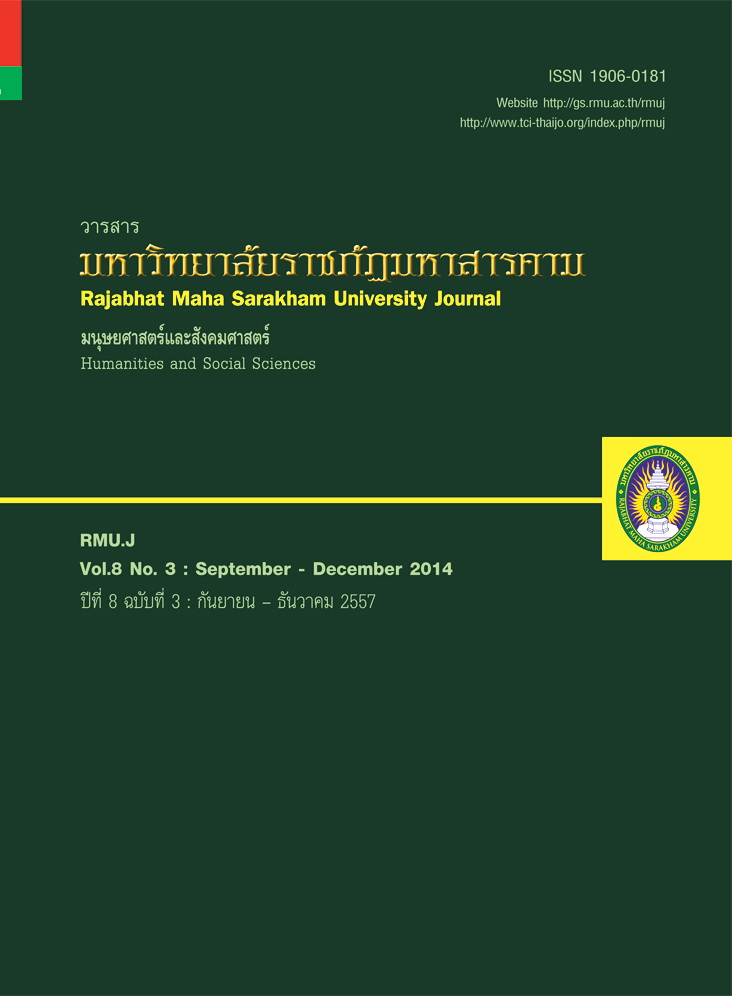บทบาทของผู้นำที่มีต่อกระบวนการจัดการความรู้ วิสาหกิจชุมชน ที่ประสบความสำเร็จ ภายใต้โครงการ สินค้าประเภทหนึ่งตำบลหนึ่งผลิตภัณฑ์ ระดับ 5 ดาว จังหวัดบุรีรัมย์ : ถอดบทเรียน Leadership Roles on Knowledge Management Process in Successful Community Enterprise Un
Main Article Content
บทคัดย่อ
การวิจัย เรื่อง บทบาทของผู้นำที่มีต่อกระบวนการจัดวิสาหกิจชุมชนที่ประสบความสำเร็จภายใต้โครงการ สินค้าประเภทหนึ่ง
ตำบลหนึ่งผลิตภัณฑ์ ระดับ 5 ดาว จังหวัดบุรีรัมย์ : ถอดบทเรียน มีวัตถุประสงค์ ประการแรก เพื่อศึกษากระบวนการจัดการความรู้
ของวิสาหกิจชุมชน สินค้าประเภทหนึ่งตำบลหนึ่งผลิตภัณฑ์ จังหวัดบุรีรัมย์ ที่ประสบความสำเร็จในการดำเนินธุรกิจได้ระดับ 5 ดาว
และประการที่สอง เพื่อศึกษาและถอดบทเรียน บทบาทของผู้นำที่มีต่อกระบวนการจัดการความรู้ของวิสาหกิจชุมชน กลุ่มเป้าหมายใน
การศึกษา เป็นวิสาหกิจชุมชน จำนวน 4 กลุ่ม ได้จากการเลือกแบบเจาะจง (Purposive sampling) แต่ละกลุ่มประกอบด้วย ประธาน
และคณะกรรมการกลุ่มวิสาหกิจชุมน รวมจำนวน 34 คน ทำการวิเคราะห์ข้อมูลโดยการวิเคราะห์เนื้อหา (Content analysis) ผลการ
วิจัยพบว่า
1. กระบวนการจัดการความรู้ มีผลดังนี้
1.1 การบ่งชี้ความรู้ ทุกวิสาหกิจชุมชนจะเริ่มต้นทำธุรกิจโดยอาศัยความรู้เดิม จากการสืบทอดต่อกันมา การพัฒนาตาม
กระแสระบบทุนนิยม การร่วมกันสร้างขึ้นเองระหว่างสมาชิกในกลุ่ม การแก้ไขปัญหาทางเศรษฐกิจ โดยการสร้างรายได้เพิ่ม และอิทธิพล
ทางความคิดและการชี้นำจากภาครัฐ
1.2 การสร้างและการแสวงหาความรู้ ได้มาจากบรรพบุรุษ กระบวนการในการผลิต การแลกเปลี่ยนเรียนรู้ การจดจำรูป
แบบผ่านสื่อต่างๆ การฝึกอบรมสัมมนาและการศึกษาดูงาน
1.3 การจัดการความรู้ให้เป็นระบบ ได้แก่ การจัดเก็บความรู้ผ่านตัวบุคคล ผลงานการผลิต ระบบเอกสารที่หน่วยงานจัด
ทำและระบบเอกสารที่หน่วยงานอื่นจัดทำให้
1.4 การประมวลความรู้และการกลั่นกรองความรู้ ได้แก่ ความรู้จากการแก้ไขปัญหาด้านการบริหารจัดการ จากการออกแบบ
ผลิตภัณฑ์ และจากการปรับปรุงกระบวนการผลิต
1.5 การเข้าถึงความรู้ ได้แก่ การจัดป้ายประชาสัมพันธ์ การเผยแพร่เอกสารประชาสัมพันธ์ที่หน่วยงานจัดทำขึ้นเอง
และหน่วยงานอื่นจัดทำให้
1.6 การแบ่งปันแลกเปลี่ยนความรู้ ได้แก่ ประธานกลุ่มถ่ายทอดความรู้ให้แก่สมาชิก การแลกเปลี่ยนเรียนรู้ร่วมกันระหว่าง
สมาชิกกลุ่ม การฝึกอบรมสัมมนา และระบบพี่เลี้ยง
1.7 การเรียนรู้ ได้แก่ การเป็นวิทยากรอบรม การเป็นศูนย์การเรียนรู้สำหรับชุมชน การถ่ายทอดโดยการสาธิต
การเป็นครูพิเศษให้กับนักเรียน นักศึกษา
2. บทบาทผู้นำในการจัดการความรู้วิสาหกิจชุมชน งานวิจัยนี้สรุปบทบาทผู้นำออกเป็น 3 ด้าน ได้แก่
2.1 บทบาทผู้นำในฐานะผู้อำนวยประโยชน์ ได้แก่บทบาทในการบ่งชี้ความรู้ การสร้างและการแสวงหาความรู้ และการจัด
ความรู้ให้เป็นระบบ
2.2 บทบาทผู้นำในฐานะผู้เอื้อประโยชน์ ได้แก่ บทบาทในการประมวลและกลั่นกรองความรู้ บทบาทในการเข้าถึงความรู้
และบทบาทในการแลกเปลี่ยนความรู้
2.3 บทบาทผู้นำในฐานผู้ประสานเชื่อมโยงเครือข่าย ได้แก่บทบาทในการเรียนรู้
3. ศึกษาและถอดบทเรียนเพื่อนำมาสร้างแบบแผน บทบาทของผู้นำที่มีต่อกระบวนการจัดการความรู้ วิสาหกิจชุมชน
ที่ประสบความสำเร็จ ภายใต้โครงการ สินค้าประเภทหนึ่งตำบลหนึ่งผลิตภัณฑ์ ระดับ 5 ดาว จังหวัดบุรีรัมย์
The Leadership Roles on Knowledge Management Process in Successful Community Enterprise Under
the Project of the 5 Stars Award (OTOP) in Buriram : Lessons Learned aim are: 1) To study Buriram’s successful
5 stars award community enterprise according to the use Knowledge Management Process. 2) To study and
to receive lessons learned with the Leadership roles on Knowledge Management Process in community
enterprises. The target goal of this study consists of 4 community enterprises. Purposive sampling was applied
for 4 presidents and 30 committees. Descriptive reports and content analysis were used to describe the basic
features of the data in a study
Summarized below are the findings from the community enterprises (OTOP) research study.
1. Knowledge Management Process of successful community enterprises consisted of:
1.1 Knowledge Identification. They are the knowledge from tacit knowledge, from how to survive
in Capitalism regime, from brainstorming in communities, from economic problems solving, from long term
strategic planning.
1.2 Knowledge Creation and Acquisition. They create and acquire the knowledge from their old
community sources, from producing process, from training and seminars, from knowledge sharing, from mass
media and from field trips.
1.3 Knowledge Organization. They are the tacit knowledge of persons, tacit knowledge in
products, community documentaries and documentaries produced by other organization.
1.4 Knowledge Codification and Refinement. They are the knowledge from administrative problem
solving, from product design and from productivity improvement.
1.5 Knowledge Access. They are the posters, community documentaries and documentaries
produced by other organizations.
1.6 Knowledge Sharing. The way of knowledge sharing is from the leaders to members, between
members and training by seniors.
1.7 Learning. The ways of learning are the leaders as lecturer, community enterprises as learning
centers, training for demonstration and student training.
2. Leadership roles in Knowledge Management according to the 7 steps of Knowledge Management
creation model from the office of the Civil Service Commission (OCSC), were separated in to 3 leadership roles.
2.1 Leader as Chief Knowledge Officer. They act for knowledge identification, knowledge creation
and acquisition and knowledge organization.
2.2 Leader as Knowledge Facilitators. They act for knowledge codification and refinement,
knowledge access and knowledge sharing.
2.3 Leader as Network Managers. They act to facilitate leaning together.
3. To study and to receive Lessons learned in order to make a Leadership Knowledge Management
Process Plan for developing successful community enterprises.
Article Details
1. บทความที่ลงตีพิมพ์ทุกเรื่องได้รับการตรวจทางวิชาการโดยผู้ประเมินอิสระ ผู้ทรงคุณวุฒิ (Peer Review) สาขาที่เกี่ยวข้อง อย่างน้อย 3 ท่าน ในรูปแบบ Double blind review
2. ข้อคิดเห็นใด ๆ ของบทความที่ลงตีพิมพ์ในวารสารมหาวิทยาลัยราชภัฏมหาสารคาม นี้เป็นของผู้เขียน คณะผู้จัดทำวารสารไม่จำเป็นต้องเห็นด้วย
3. กองบรรณาธิการวารสารมหาวิทยาลัยราชภัฏมหาสารคาม ไม่สงวนสิทธิ์การคัดลอกแต่ให้อ้างอิงแสดงที่มา


